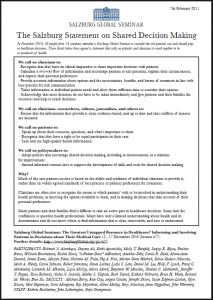March 30th, 2011 by DavedeBronkart in Health Policy, News
No Comments »

 Last Thursday at the headquarters of the British Medical Journal in London, an important announcement will be made about patients’ rights to be actively involved in decisions about their treatment. Below is the press release about it.
Last Thursday at the headquarters of the British Medical Journal in London, an important announcement will be made about patients’ rights to be actively involved in decisions about their treatment. Below is the press release about it.
The subject is shared decision making, which we’ve been posting about recently (series here; initial post here.) Developed by the participants in a Salzburg Global Seminar last December, the document is called the Salzburg Statement. The pivotal distinction here is the difference between informed consent, in which the physician assesses the options and selects one, and gets your consent to do it; and informed choice, in which clinicians tell you the options, with all the pros and cons, and let you choose, based on your preferences.
Click the image to download. (It’s an A4 PDF; to print, those using letter size paper should select “Page Scaling: Fit.”)
Here’s today’s press release: Read more »
*This blog post was originally published at e-Patients.net*
December 29th, 2010 by eDocAmerica in Better Health Network, Opinion
No Comments »

Recently, I was involved in a discussion on an email list serve and decided to takes some of my comments on patient autonomy and blog about them. This arose following a debate about whether the term “patient” engendered a sense of passivity and, therefore, whether the term should be dropped in favor of something else, like “client” or something similar.
Having participated in the preparation and dissemination of the white paper on e-patients, I don’t see the need for “factions” or disagreements in the service of advancing Participatory Medicine. As Alan Greene aptly stated: “This is a big tent, with room for all.”
I want all of my patients to be as autonomous as possible. In my view, their autonomy is independent of the doctor-patient relationship that I have with them. They make the choice to enter into, or to activate or deactivate, the relationship with me. They may ignore my input, seek a second opinion, or fire me and seek the care of another physician at any time. They truly are in control in that sense. The only thing I have control over and am responsible for is trying to provide the best advice or consultation I can. Read more »
*This blog post was originally published at eDocAmerica*
 Last Thursday at the headquarters of the British Medical Journal in London, an important announcement will be made about patients’ rights to be actively involved in decisions about their treatment. Below is the press release about it.
Last Thursday at the headquarters of the British Medical Journal in London, an important announcement will be made about patients’ rights to be actively involved in decisions about their treatment. Below is the press release about it.











